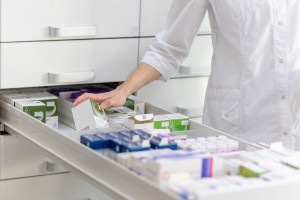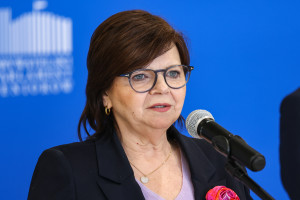Over 30 thousand cases, 25 thousand deaths per year. In the Sejm about digestive system cancers

- Every year, more than 30 thousand new cases of cancer of the digestive tract are diagnosed in Poland: pancreas, liver, gallbladder, colon, stomach, esophagus. Each year also brings more than 25 thousand deaths due to them.
- In 2022, the payer spent approximately PLN 318 million on drug programs, and in 2024 - PLN 503 million. Over the last four years, 20 new molecule-indications have been reimbursed
- The amount of funds spent on services related to digestive system cancers is growing. In 2021, it was PLN 1.5 billion, while in 2024 it will be PLN 3 billion
- In 2021, comprehensive care was provided to approximately 10,000 patients, in 2024 - over 55,000. Expenditures on comprehensive care are also growing - from PLN 83 million in 2021 to PLN 603 million in 2024.
- Every year, over 30,000 new cases of cancer of the digestive tract are diagnosed in Poland: pancreas, liver, gallbladder, colon, stomach, esophagus. Each year also brings over 25,000 deaths due to them, which means that they constitute a major social problem - said experts at a session of the Sejm's Permanent Subcommittee on Oncology.
Tomasz Kuleta , head of the guaranteed benefits department at the Department of Medical Treatment of the Ministry of Health, presented data on the care of patients with these cancers.
- Over the last four years, 20 new molecular indications have been covered by reimbursement. In order to expand the availability of reimbursed therapies, some active substances are also moved from drug programs to the chemotherapy catalog. In 2022, the payer spent approximately PLN 318 million on drug programs, and in 2024 - PLN 503 million . In just two years, there was an increase in spending by 63% - said Chief Kuleta.
- The number of DiLO cards issued in connection with the diagnosis or suspicion of digestive system cancer is systematically growing. In 2022, there were 22.1 thousand of them, in 2024 - already 25.3 thousand , with the most common being the diagnosis or suspicion of colon cancer, rectal cancer and stomach cancer. As the number of DiLO cards issued increases, the percentage of diagnostic tests carried out on time decreases, while the number of tests increases. The same is happening in the case of in-depth diagnostics - he pointed out.
He added that the amount of funds spent on services related to digestive system cancers is also systematically growing. In 2021, it was PLN 1.5 billion , while in 2024 it will be PLN 3 billion, i.e. twice as much.
As Tomasz Kuleta noted, the National Health Fund data show that the number of patients with these cancers covered by comprehensive oncological care is also systematically increasing: in 2021 it was about 10 thousand patients, in 2024 - already over 55 thousand. Expenditures on comprehensive care are also growing - from PLN 83 million in 2021 to PLN 603 million in 2024.
What about prevention?He recalled that when it comes to prevention, there is a nationwide colon screening program for people aged 50 to 65, or 40 to 49 if their closest relatives have had this cancer. In 2023, over 65,000 patients underwent screening colonoscopy (the value of services was PLN 78 million), and in 2024 – 86,000 (the value of services was PLN 115 million).
- Since May this year, the Moje Zdrowie program has also been launched - an adult's health assessment. One of the tests available to patients over 50 years of age under this program is the FIT-OC test for occult blood in feces - added Chief Kuleta.
Konrad Korbiński, director of the Department of Coordinated Care at the Ministry of Health, referred to the NIK report from 2025, which identified three issues related to coordinated care for patients with digestive system cancers.
- The first concerns insufficient spending on prevention and screening tests. Here, since May, the FIT test has been included in the aforementioned Moje Zdrowie program, which will allow for an increase in the number of patients included in screening based on colonoscopy. This is a very big change when it comes to early detection of colon cancer - he noted.
"The solution to many problems is the National Oncology Network"- The second issue indicated by NIK concerns the fact that 80% of patients with digestive system cancers did not have a DiLO card issued. This is a significant problem, but this scope will be sorted out within the National Oncology Network. From 1 January 2027, the electronic DiLO card will be a mandatory document related to the provision of oncological care from public funds - he indicated.
As he said, this is an important change not only in the context of supporting the coordination of diagnostics and treatment, but also in the context of collecting data and measuring the quality of care.
- The third issue is the implementation of the National Oncology Network. It has set out the levels of oncological care security SOLO I, II and III, which employ oncological care coordinators trained by the National Institute of Oncology. In September this year, training dedicated to a larger group will begin. It will be conducted at least until 2028. Of course, the aim is to have significantly more coordinators, but also to ensure that they have greater competences in managing the care process - noted Konrad Korbiński.
He added that within the KSO, key recommendations were also issued – standards of oncological care, including in the field of digestive system cancers: small intestine, large intestine and pancreas. The guidelines will of course be subject to updates.
- Generally: the reservations reported in the NIK report concern the year 2023 and the beginning of 2024, when the process of implementing the National Oncology Network has not yet started. Now we are on the right track to improving diagnostics and tightening screening, but also to better coordination of care - assured the director of the Department of Coordinated Care at the Ministry of Health.
Copyrighted material - reprint rules are specified in the regulations .
rynekzdrowia

![Every 3 or 5 years. From today, a new program and free tests on the National Health Fund. Basic and extended [LIST]](https://pliki2.rynekzdrowia.pl/i/22/48/42/224842_r0_300.jpg)










